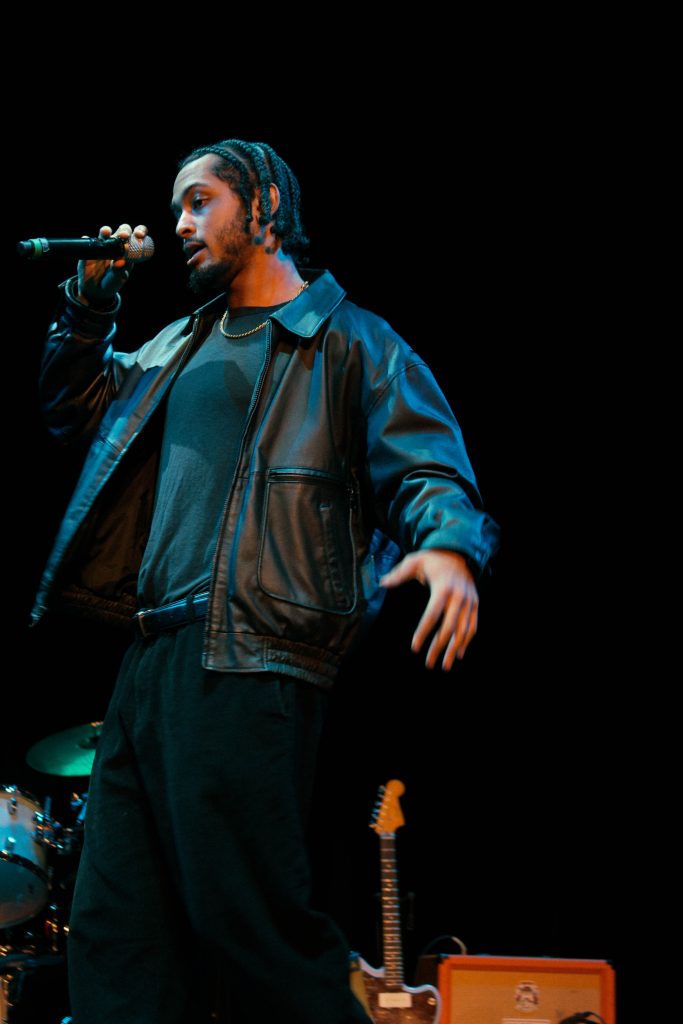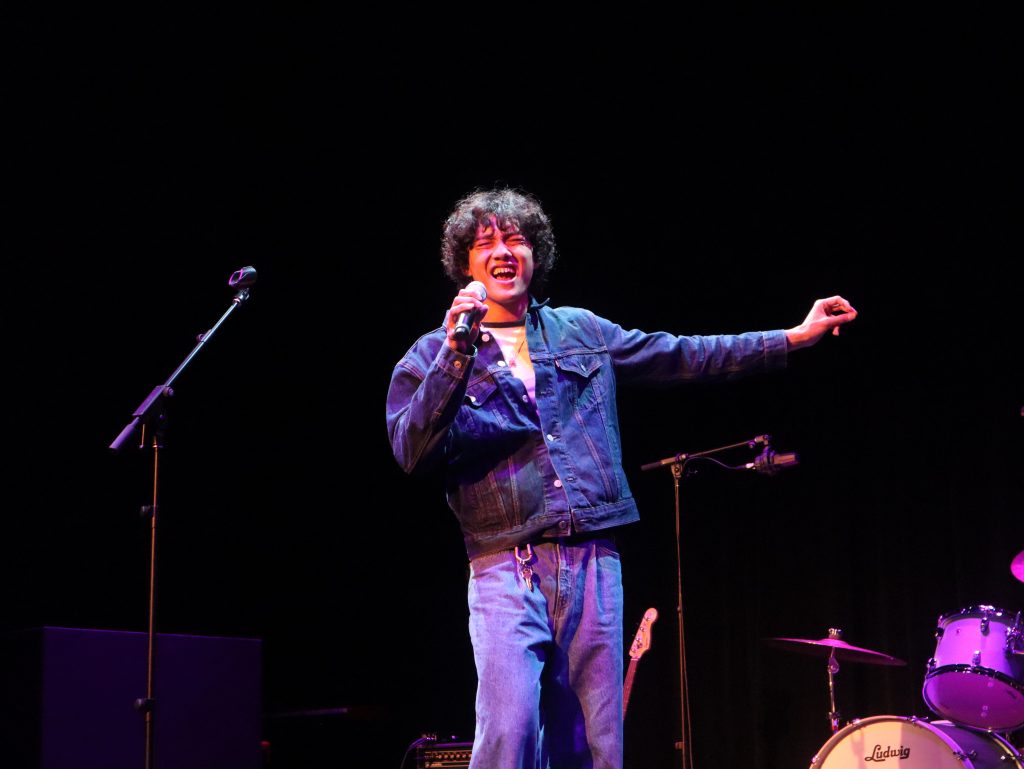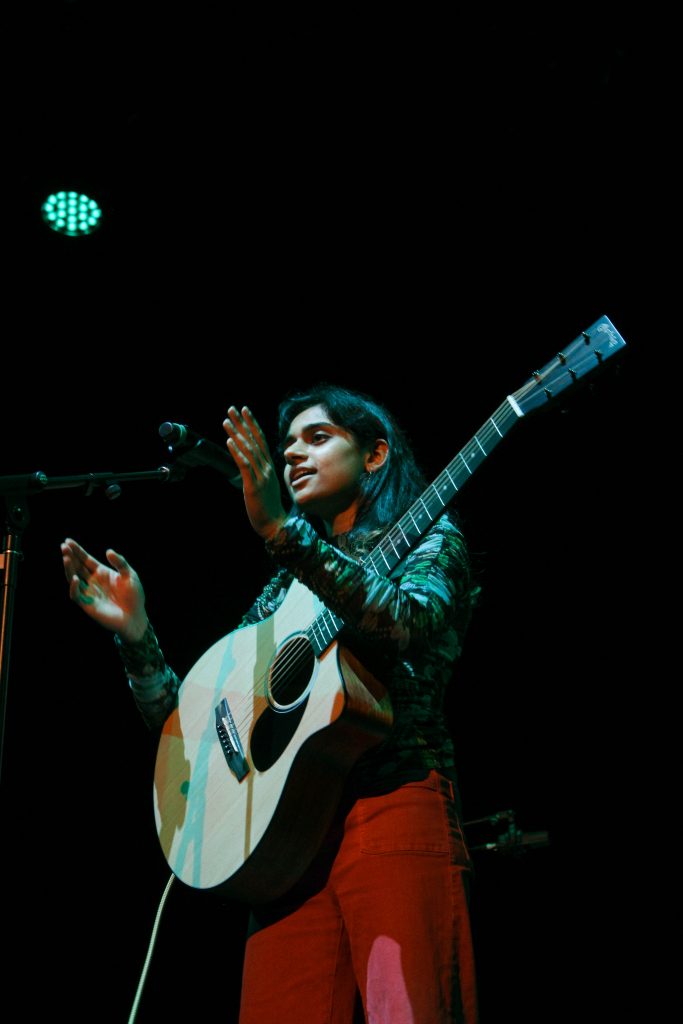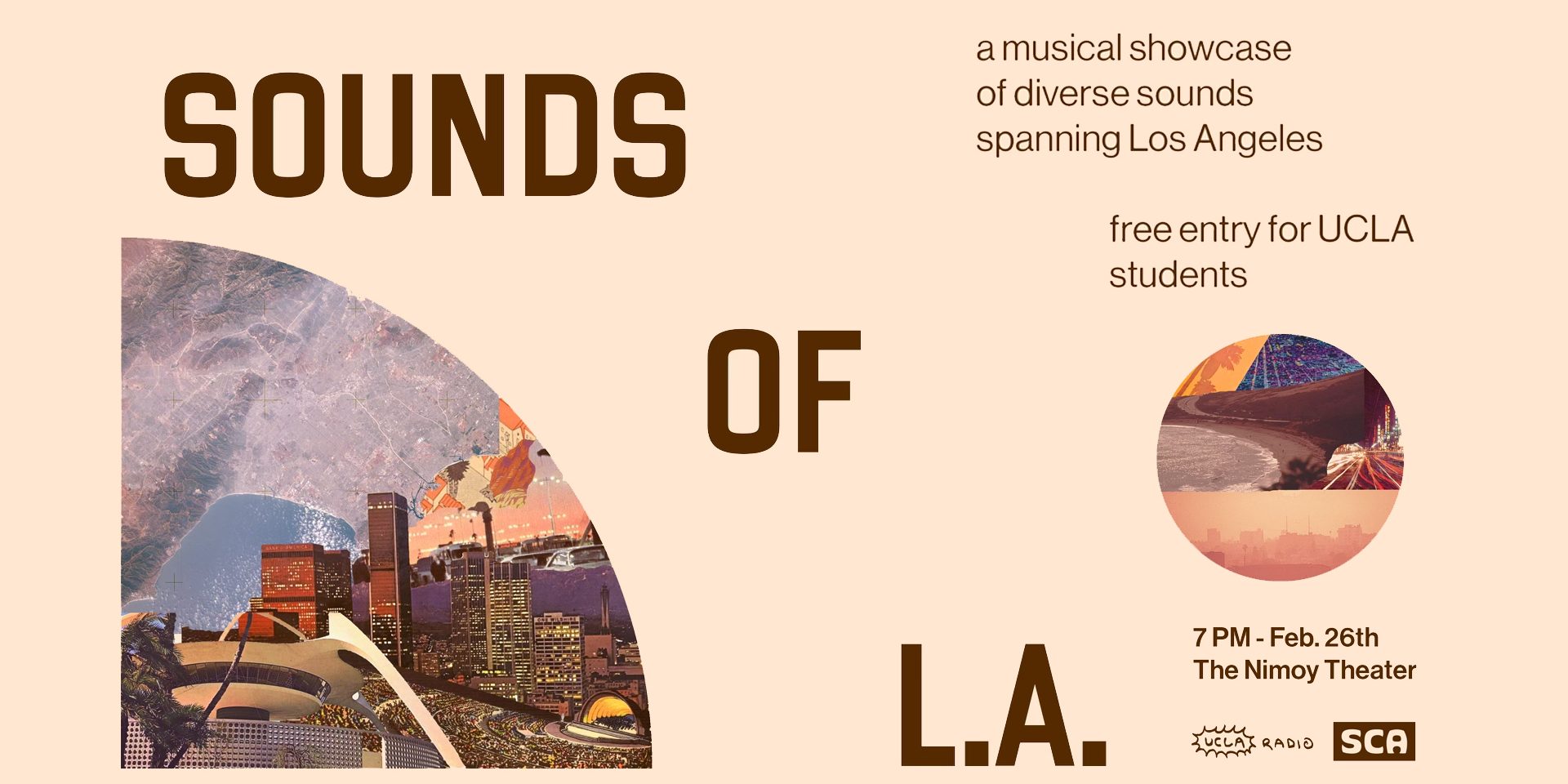The following description is taken from the Sounds of LA website.
Jay Satten
Los Angeles-based Jay Satten is a dynamic force in hip-hop, drawing inspiration from his roots in Chicago and New York. His music blends influences from Quincy Jones to Kanye West, maintaining a sound uniquely his own.

RC Avenue
Years in the making, nineteen year-old Filipino-American singer RC AVENUE has been delivering spacious tones and out of this world feelings to Pop/R&B music listeners globally. Hailing from Los Angeles, California, RC AVENUE takes heavy inspiration from the likes of Bruno Mars, Justin Bieber and Michael Jackson.

Shilpa
SHILPA is her experimental-acoustic quest to understand what it means to love in a queer Indian-American body. Her debut album, ESSAR, explores the loss of family, befriending of strangers, and wild adventures in the mountains.




—
This interview has been edited for clarity and brevity purposes.
Isabella: Can you share with us your experience performing at the Sounds of La showcase? What was the energy like and how did the audience respond to your music?
Satten: My experience performing was fantastic. I was the first act up and I feel like I really set the standard. I did my best and I really felt like we started at the top, at the beginning of the event. I have very high standards for myself so I knew I was going to go out there and do my thing.
RC: It was short and sweet but I feel like we packed it a punch. It was an awesome community- the performers, the green room and the students. Sounds of LA was just a good experience to meet new like minded people.
Shilpa: I thought the artists were fantastic. I always love to do crowd work and get people singing so I thought it was awesome that everyone was so willing to use their voices, make sound and be heard. It got really percussive and physical and it was very visceral. I think interacting with the audience was a lot of fun.
It went better than I expected. I wanted to do an improv show and feel it out, just go with the vibes of the audience. I picked some chords, a key, and some lyrics and all of the audience interaction was done on the fly. That as in part due to how open and attentive the listeners were so I thought that was really fun.
Isabella: What was the process like preparing for the showcase and how did you choose your setlist?
Satten: Everyday I am a practicing musician and every day I’m a star. This is my life. When it came to preparing for this, I wanted to do two songs that really captured some good energy and are also a part of my upcoming album. The process wasn’t that crazy. Like I said, I’ve been performing every week for the past 10 weeks. With my actor background, you kind of always have to be ready to be on stage. Life is my stage. Just give me a microphone and I’m gonna do it.
RC: The day before the Sounds of LA, I had a headline show for UC San Diego. I basically just took two songs from that set and performed them at the showcase. LA was energetic, people were dancing and the crowd was really excited.
Shilpa: For the past couple of months, there’s been this chord progression that has been stuck in my head and I’m a very like improv heavy musician and I have a lot of random pieces of vocal lines that kind of fit into that. In the weeks leading up to the show, I kind of realized that those chords worked with an existing song that I had written called “Headlights” and a song called “Maneater” by Hall & Oates.
I thought it would be super fun to do a random mashup of these three and bring in random vocal lines that maybe people haven’t heard before. I think I just wanted to explore performing outside of a conventional song structure.
—
Interview w/ Satten
Isabella: What challenges have you faced in navigating the music scenes in the different places you’ve lived in and how have they shaped your journey as an artist?
Satten: The only challenge and I’ll say this is waiting. The challenge is being patient because there’s a knowing that you have when you know you’re one of one, that you’re destined for greatness. I’ve had that knowing but you can’t get frustrated with it because you’re going to find yourself in a place where your art isn’t healthy anymore. I never want to be in that place. I’ve grown so much since Freshman year to now and I’m so thankful for it. At the end of the day, we don’t control any of this and in order to really make it, you got to believe in you the most because no one else is going to do that for you. When you do that, when you reach that level of self-belief, no one can knock it, no one can shake it, no one can break it, no matter what.
Isabella: How do you see the hip-hop scene in Los Angeles evolving and what contributions do you hope to make to that evolution?
Satten: Hip hop itself is a beautiful thing and it evolves every day but it’s also very saturated. I feel like I’m gonna lead the hip hop evolution. I know that I got it and no one’s doing it like I do it. Nowadays in the music scene, the one thing that’s coming back is live performance and how important that is. We live in an age where there’s a lot of people that don’t know how to perform because they’re just making tracks in their bedroom on their phone, and granted I got my start making tracks on my iphone as well. That’s fantastic but there’s something about being an artist, being a star that you also have to be a performer and an entertainer.
Isabella: What role do you believe hip hop music plays in shaping culture, especially in Los Angeles, and how do you see your music contributing to that impact?
Satten: Hip hop itself is culture. Hip hop music is not just something that shapes a culture or a tool to shape a culture but a place of refuge for a lot of people. It’s real raw emotion. Hip hop is so integral to our landscape as musicians because everybody wants to do it and there’s something real about the rawness that comes through when listening to a hip hop song or an r&b song or any urban music genre. I wouldn’t categorize myself as just hip hop. It’s urban music roots but with all influences applied.
—
Interview w/ RC Avenue
Isabella: Can you tell us about your journey as a young Filipino artist in the pop industry?
RC: I’ve been a musician all my life but it was until Middle School, I picked up producing and that was basically my outlet. What really catapulted me into pop music was actually an unfortunate event that I’m actually so grateful for.
My family actually became homeless and during those sad times, listening to pop music- Michael Jackson, Bruno Mars, Prince- that shit just made my world so bright and so fun. I just wanted to focus on being happy and what made that was making that type of music.
Isabella: How do you stay connected with your family roots while also appealing to a much bigger, global audience?
RC: I’ll always be connected to my family because we’re all musicians. My dad taught me everything; he’s a guitarist, a drummer, a singer, he’s the whole shabang. That’s where I learned. I’ll always stay connected with my family through art and being inspired by all of them.
Isabella: As someone who is still so young, how have your personal experiences as a teenager influenced the themes and messages in your music?
RC: Especially during this time of my life, learning new things, things are coming and going, I often feel so sentimental. Living in the moment, I’m moving fast and being true to myself. It’s hard to navigate. I’m basically adulting already and staying true is how I stay sane. Being honest, genuine and just having fun.
Isabella: What are your aspirations for using your music to spark conversations and create a sense of community among fans facing similar coming of age experiences?
RC: I want to hold these shows where kids that are alike- they love upbeat, energetic music- I want to create this sanctuary. I want my concerts to be a safe space for people to dance and people to sing, even if you don’t know how. That’s what I want to do: hold these concerts that are just a fun space for energetic kids.
—
Interview w/ Shilpa
Isabella: How do you balance the intimate aspects of your own personal life with the universal themes of love, nature and emotional vulnerability in your music?
Shilpa: I think I am a very private person and I like to select what I share with the world. I think somewhere along the lines, I was getting too deep in the weeds of engineering, which is my major. At some point, I was like, I’m not communicating what I want to and I’m not taking up space in the world like I want to so I kind of just have to be okay with wanting to be private but also wanting to resonate with people.
I think the benefit of that and the benefit of making people feel, far outweighs any sense of violating my privacy. It’s universal to feel a little bit lost or out of place or even culturally misinterpreted.
Isabella: How do you hope your music resonates with listeners who may also find solace and comfort in emotional expression?
Shilpa: I live for the moment where people will come up to me and they’ll tell me that my art made them feel something that I would have never predicted. My coworker came up to me and this was after I released “Nani”, which was the first song that propelled me to start releasing music and I wrote about the death of my grandmother. There’s a line in there: “And if I wear old shoes, Will I keep the dirt, Like you kept the dirt Alive, it could not live without you”. My coworker came up to me a couple weeks after it was released and he started bawling at that lyric because he lent his grandfather his chaplis, which is the Hindi slang for shoes. His grandfather later died and his coworkers got his chaplis back and he wears them and thinks of them every time.
I never would have thought of that because I wrote the line metaphorically but here you are actually drawing a physical sense from my music and thinking of an actual memory. That’s crazy. The fact that some art that I made has elicited an actual response in use is so cool.
Isabella: How does your identity as a queer individual influence the way you express yourself and your emotions through your music?
Shilpa: I think knowing that that’s the way that I love does particularly feel different in a cultural environment, when it’s juxtaposed with my relationship with my family. I think anyone who’s queer and Asian at the same time probably has a similar experience. I don’t want to speak for everyone but it really does really make you think about how each generation kind of breaks a cultural barrier. I think that I am in some ways doing that, not by choice but it’s what I end up having to do if I want to live life the way that I want to. That frustration ends up making its way into my music because it’s something I think needs to be talked about.
My music has a very strong connection with cultural roots and a lot of that is born out of that frustration and dissonance between being an identity that is easier to have in America but also feeling like you’re not totally American and feeling like you come from somewhere else.
—
Follow Jay Satten @jaysatten on Instagram, listen to “Up” on April 4 and look out for his album release party on April 5!
Follow RC Avenue @rcavenue on Instagram and listen to “SO WHAT”, released at the end of the month!
Follow Shilpa @shxlpashxlpa on Instagram!




